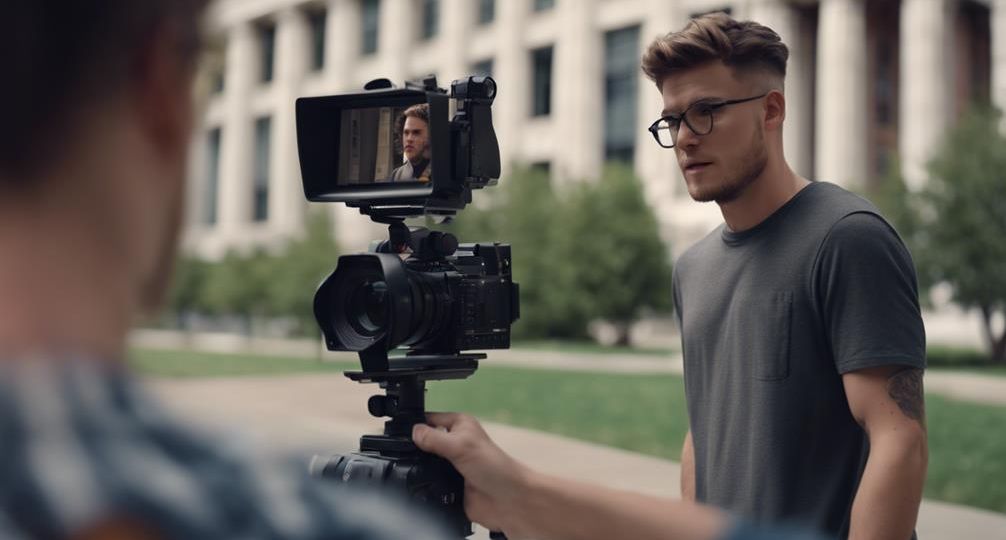
Can I sue a Youtuber for filming me?
Imagine you’re a bird, flying carefree in your sky. Suddenly, you’re caught in the frame of a Youtuber’s video, your privacy unwittingly invaded. Can you sue this Youtuber for filming you without your consent? This question navigates the tricky waters of privacy rights, filming laws, and the gray areas of public spaces. It’s a complex issue with no one-size-fits-all answer. As we peel back its layers, you’ll find potential courses of action you could take to protect your privacy.
Stay with us, there’s much to uncover.
Key Takeaways
- You can sue a YouTuber for filming you without consent, violating your privacy rights protected by law.
- Invasion of privacy, defamation, and harassment are legal grounds for suing.
- YouTube’s policies support reporting privacy violations and breaching these can have consequences.
- Successful lawsuits require strong evidence of harm caused by the violation.
Understanding the Right to Privacy
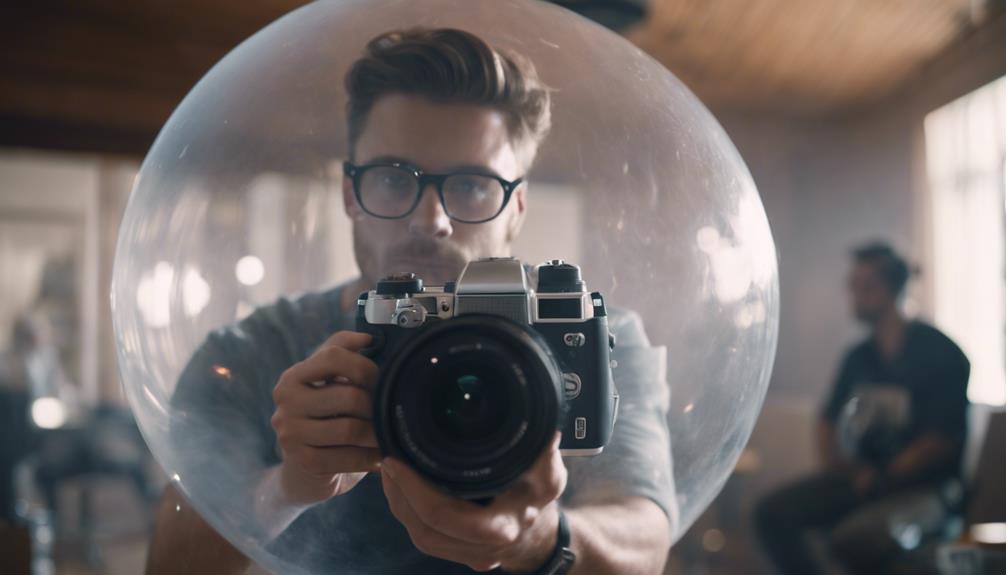
Firstly, it’s crucial to understand your right to privacy, a fundamental aspect that protects individuals from unwanted intrusion into their personal lives. In the digital age, where our lives are increasingly intertwined with technology, this right is more important than ever.
Digital Ethics, a burgeoning field, seeks to balance the benefits of technology with the preservation of personal privacy. It asks tough questions: How do we utilize technology responsibly, without sacrificing our own privacy or that of others? Privacy legislation, on the other hand, provides a legal framework to safeguard our personal information from misuse.
You should know that privacy isn’t just about what you keep hidden; it’s about having control over your personal information. It means deciding who knows what about you and when. This is where privacy legislation steps in, providing you with legal recourse if your privacy is violated.
Legal Definition of Consent
While understanding your right to privacy is key, it’s equally important to grasp the legal definition of consent, particularly in situations where you may be filmed without permission. Consent, in this context, refers to your deliberate agreement to be filmed or photographed. It’s a fundamental aspect of privacy legislation and it’s not to be taken lightly.
Now, let’s dive into consent education. It’s essential to understand that consent must be clear, conscious, and voluntary. It isn’t merely about saying ‘yes’ or ‘no’, but rather about fully understanding what you’re agreeing to. Consent can be withdrawn at any time and it’s not indefinite. It’s your right to change your mind.
Consent legislation also plays a significant role. These laws are designed to protect your rights and enforce penalties for violations. They help maintain a balance between freedom of expression and individual privacy in our digital age. It’s innovative legislation like this that keeps pace with evolving technologies and social media platforms.
Filming in Public Spaces: A Grey Area
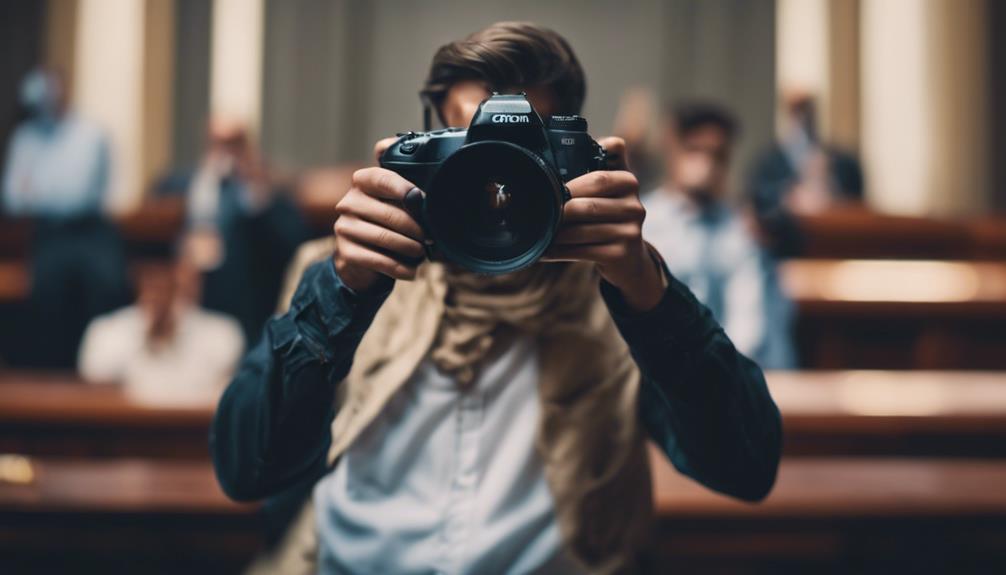
Despite the clarity surrounding consent in private settings, when it comes to filming in public spaces, you’re entering a legally grey area. The line between public surveillance laws and covert filming ethics can become blurred, making it a complex issue.
Consider the following points:
- While public surveillance laws typically allow for filming in public spaces, the ethical implications of covert filming are much more nuanced.
- You should be cautious when you’re being filmed without explicit consent, even in public places.
- The purpose of the footage also matters. If it’s for a commercial purpose or to cause harm, you might have grounds for a lawsuit.
- Courts often consider whether a reasonable expectation of privacy exists in the situation when determining the legality of the filming.
Knowing your rights in this situation can be empowering. It’s essential to stay informed and understand the complexities of filming in public spaces. Don’t assume that just because you’re in public, you’re fair game for covert filming. You have a right to your privacy, and that deserves respect, even in public spaces. Remember, the law is a tool for your protection.
When Does Filming Become Harassment?
Navigating the complexities of public filming, it’s crucial to identify when this practice crosses over into harassment, a violation that can serve as grounds for legal action. Understanding the ‘Harassment Thresholds’ and the ‘Cyberbullying Impact’ is vital to assessing when filming becomes harassment.
When the action of filming starts infringing on your personal privacy rights, it transitions into harassment territory. Unwanted attention, intrusive behavior, or offensive content can trigger these thresholds of harassment. To further illustrate these thresholds, consider this table:
| Harassment Threshold | Example | Potential Legal Action |
|---|---|---|
| Unwanted Attention | Continual filming even after request to stop | Suing for Invasion of Privacy |
| Intrusive Behavior | Filming in private spaces without consent | Suing for Trespassing |
| Offensive Content | Filming to intimidate, embarrass or bully | Suing for Defamation |
The ‘Cyberbullying Impact’ is an additional factor to consider. The vast reach of YouTube can amplify the negative effects of harassment. The global audience can lead to wider spread humiliation, anxiety or fear, which are tangible detrimental effects.
The Role of YouTube’s Policies
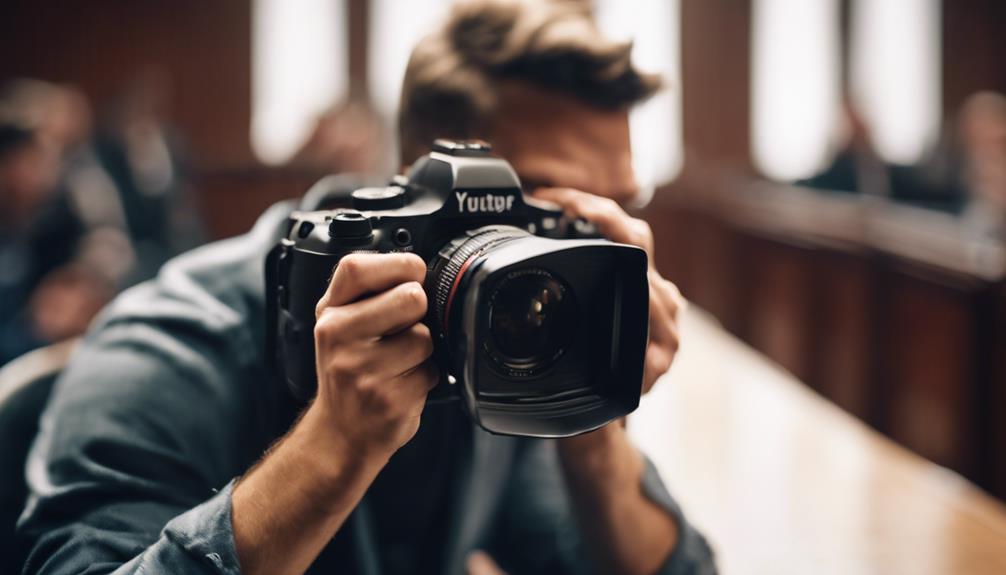
You need to grasp the fundamentals of YouTube’s privacy policy to fully understand your rights.
The platform’s content reporting process plays a significant part in addressing potential privacy violations.
If someone breaches these policies, there are distinct consequences, which could be pivotal in your case against a YouTuber.
Understanding YouTube’s Privacy Policy
To grasp your rights under YouTube’s privacy policy, it’s crucial to comprehend the platform’s underlying rules and guidelines. This understanding is essential in navigating the realm of social media regulations, and underscores the importance of privacy settings.
Here are key aspects to consider:
- YouTube’s privacy policy outlines how your data is managed. It’s your responsibility to understand and set your preferences.
- YouTube adheres to stringent social media regulations, providing robust protection for users.
- The platform’s privacy settings are critical in protecting your personal information. Familiarize yourself with these controls.
- The policy is in place to protect users, not infringe on rights. So, it’s vital to comprehend it fully.
YouTube’s Content Reporting Process
In the face of potential privacy violations, YouTube’s content reporting process serves as a vital tool, allowing you to flag inappropriate content or breaches of privacy. It’s a user-friendly system, designed to uphold content authenticity and protect you against copyright infringements.
By simply clicking the ‘report’ button under a video, you can initiate a review by YouTube’s team. This process is a testament to YouTube’s commitment to creating a safe and respectful environment. It’s a forward-thinking solution, matching the innovative spirit you crave.
However, it’s your responsibility to use this tool wisely and promptly when your rights are compromised. YouTube’s policies are a powerful ally in your fight for privacy, so trust in their efficacy and make full use of them.
Violations and Potential Consequences
Despite the robust system in place, it’s imperative to understand the potential violations and consequences that may arise if YouTube’s policies aren’t adhered to. Intrusive filming is a violation that YouTube takes seriously.
- If you’re the victim of intrusive filming, you’ve the right to report it.
- YouTube can remove the content and possibly ban the offender.
- YouTube’s actions don’t preclude your right to seek legal recourse.
- Your legal action can lead to significant consequences for the YouTuber.
It’s crucial to remember that YouTube is only a platform. Its policies can’t replace your legal rights. You must ensure your rights are respected, and if they’re infringed upon, you should consider legal options. Stand against intrusive filming and protect your privacy.
Legal Precedents on Filmed Content
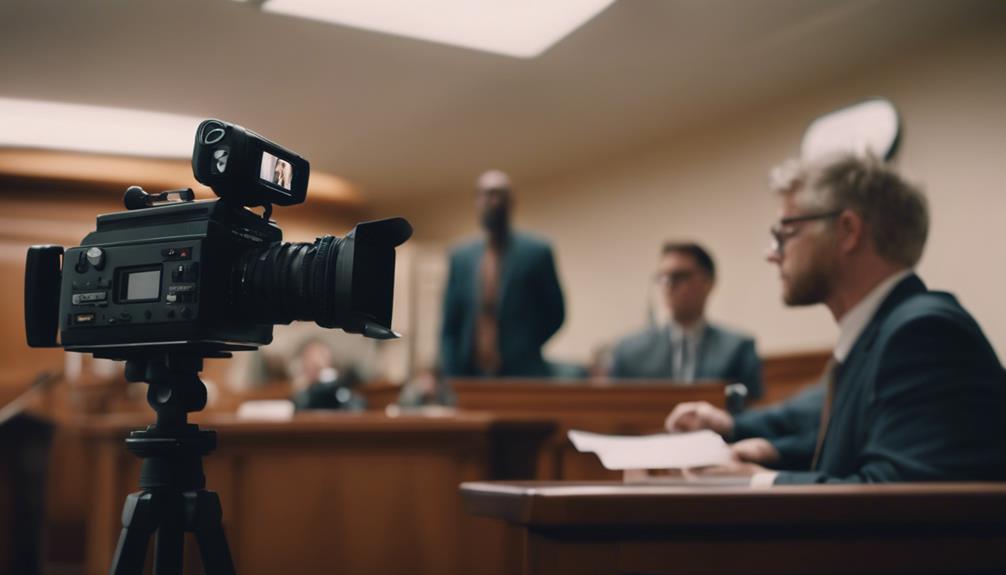
You might be wondering, ‘Where does the law stand on this?’
It’s crucial to familiarize yourself with legal precedents related to filmed content. These judgements involve aspects like ‘Right to Privacy,’ ‘Defamation and YouTube Videos,’ and ‘Consent in Public Filming’, which can significantly influence your potential legal action.
Understanding Right to Privacy
Let’s delve into the ‘Right to Privacy’ and explore some vital legal precedents that pertain to filmed content. The rise of digital surveillance has amplified concerns about privacy legislation. With technology’s relentless advance, your right to privacy might seem like a quaint notion.
But not so fast. The law is catching up, and there are key legal precedents to consider:
- Courts have consistently upheld your right to privacy in public spaces.
- Filming without consent is often considered intrusive.
- Invasion of privacy claims have been successful in cases of unauthorized filming.
- Even a public figure has certain privacy rights.
Defamation and YouTube Videos
Building on the foundation of privacy rights, it’s crucial to understand the role defamation plays in the realm of YouTube videos and the legal precedents set in this regard. Defamation, encompassing both slander (spoken) and libel (written), occurs when false statements harm one’s reputation. YouTube videos can be considered libelous if they contain harmful untruths.
Consider the table below:
| Case | Defamation Type | Defense |
|---|---|---|
| Case 1 | Slander | Truth |
| Case 2 | Libel | Privilege |
| Case 3 | Libel | Opinion |
| Case 4 | Slander | Fair Comment |
| Case 5 | Libel | Consent |
These cases shape defenses against defamation claims. Innovatively applying these, you could either protect your rights or defend against accusations. Hence, understanding defamation defenses becomes essential when dealing with YouTube content.
Consent in Public Filming
How can one navigate the issue of consent when filmed in public, particularly in the context of YouTube content creation? The answer lies within the scope of public recording laws and the concept of celebrity privacy.
Consider these key points:
- Public recording laws typically permit filming in public spaces. However, this doesn’t always mean you can’t sue if you feel your rights have been violated.
- It’s crucial to understand ‘expectation of privacy.’ If you’re in a private setting unrightfully filmed, you might’ve a case.
- YouTube’s guidelines strictly discourage content involving non-consenting individuals.
- Celebrity privacy is a grey area. While public figures somewhat lose their privacy rights, unwarranted intrusion can still be illegal.
You must understand these nuances to protect your rights effectively.
How to Identify Invasion of Privacy
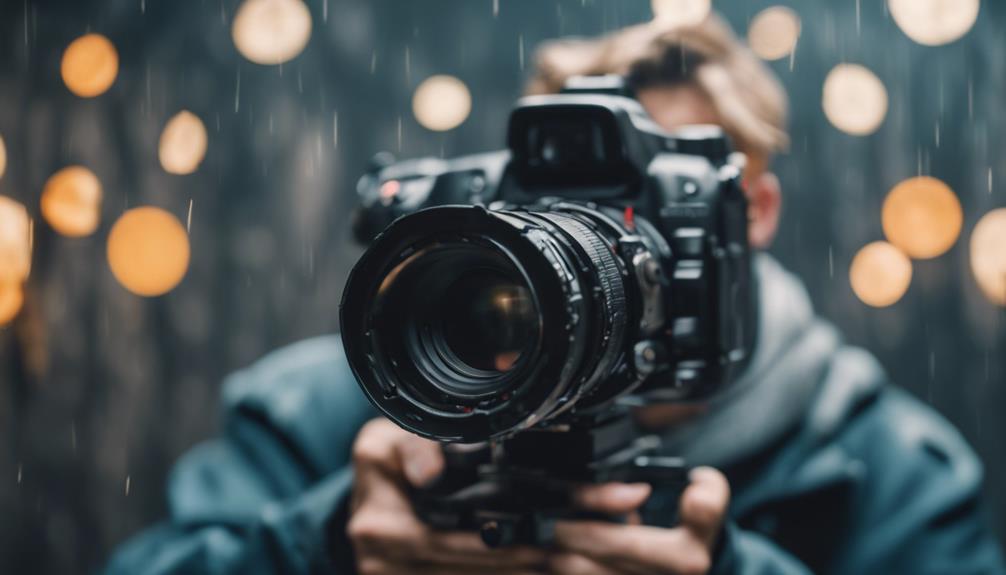
Understanding when your privacy has been invaded is crucial in determining whether you have a legitimate case against a YouTuber or any other individual. Privacy laws vary considerably, and understanding these differences is the first step in identifying an invasion of privacy. Celebrities, despite their public personas, also possess privacy rights which can be infringed upon.
Identifying invasion of privacy isn’t always straightforward. However, the innovative use of a simple two-column table can assist you in this task. The first column represents potential invasions, while the second suggests key indicators of such invasions.
| Potential Invasion | Key Indicator |
|---|---|
| Filming without consent | You didn’t give permission, yet you’re unmistakably the focus |
| Invasion into private life | Unwanted exposure of personal life details |
| Exploitation of image | Your image is used for gain without your approval |
| Misrepresentation | Your actions or words are manipulated, distorting your image |
| Breach of celebrity privacy rights | Public figures are entitled to a private life too |
Potential Damages in Privacy Lawsuits
If a YouTuber’s video of you has infringed upon your privacy rights, you may have the grounds for a lawsuit.
One important aspect to consider in such cases is the potential damages you could gain. Understanding what constitutes a privacy violation and how monetary damages are calculated will be instrumental in building your case.
Understanding Privacy Violations
In the realm of privacy lawsuits, it’s essential to grasp the potential damages associated with violations, a crucial factor when considering suing a YouTuber for filming you without consent. Digital surveillance and privacy legislation have become hot topics in our increasingly connected world, with YouTube being a notable platform for such breaches.
Understanding privacy violations involves:
- Identifying if your privacy was indeed violated.
- Determining if the YouTuber had any legitimate reasons for filming you.
- Understanding the context in which the footage was used.
- Estimating the potential harm caused by the violation.
Calculation of Monetary Damages
After determining a privacy violation, you must then calculate the possible monetary damages, a critical step in any privacy lawsuit. This damage assessment involves collecting evidence to support your claim. You’re not just tallying emotional distress or lost opportunities, but also quantifying the misuse of your image or unauthorized access to personal information.
This process can be complex and requires innovative thinking. You’ll need to be thorough and methodical in your evidence collection, ensuring every potential harm is accounted for. It’s also crucial to understand the laws surrounding privacy rights and damages.
You’re making a persuasive argument, showing the direct impact of the violation on your life. This detailed calculation of damages could significantly strengthen your case, potentially leading to a successful lawsuit.
Steps to Take if Filmed Without Consent

Should you find yourself captured on a Youtuber’s video without your consent, it’s crucial to understand the legal steps you can take to protect your privacy and rights. In a digital world that increasingly emphasizes consent education and YouTube ethics, you shouldn’t feel powerless if someone violates these principles.
Firstly, identify the video and make sure you’re indeed filmed without your consent. Then, consider the following:
- Request for video removal: Contact the Youtuber directly, explaining your situation and asking them to take the video down. They may not be aware that they breached your privacy.
- Report to YouTube: If the Youtuber refuses or doesn’t respond, report the video to YouTube. Include details about your privacy concern and request for the video’s removal.
- Document everything: Keep screenshots, emails, or any other evidence of your attempts to resolve the issue. This could be crucial if you decide to seek legal action.
- Consult with a legal professional: If the video remains online despite your efforts, it might be time to consult with a lawyer to explore your options.
Seeking Legal Aid: What to Expect
Navigating the tricky waters of privacy infringement might feel overwhelming, but seeking legal aid can offer guidance and reassurance as you explore your options. With a legal consultation, you’re not left to decipher complex laws or nuances alone; you’ll have a seasoned professional on your side.
The first step in your journey to rights awareness is understanding that you’re entitled to privacy, even in public spaces. Yes, you’ve been filmed without consent, but that doesn’t mean you’re powerless. It’s essential to recognize that your rights have been violated and then take the necessary steps to address the issue.
Legal aid provides an avenue to justice. You’ll gain crucial knowledge about the legalities of your situation, potential outcomes, and effective strategies to pursue your case. This is a chance to voice your concerns, explore potential legal avenues, and determine the best course of action.
While it might seem daunting, remember that legal professionals are there to support you. They’re equipped with the expertise and experience to handle your case. So, don’t shy away from seeking help; instead, empower yourself with rights awareness and take a stand against privacy infringement.

